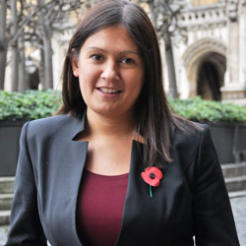The Labour Party will launch a consultation on the future of the charity sector next week, shadow charities minister Lisa Nandy said yesterday.
Nandy told delegates at the Acevo Gathering of Social Leaders that if elected, Labour would “renew our partnership with the voluntary sector” and that the consultation was intended to find out what the sector wanted from this new partnership.
“We want to know what works at the moment and what doesn’t, what your hopes are for the future,” she said. “We’ll listen to your experiences of schemes like the National Citizen Service and we won't tear up everything this government has done if it is working, but we will change things if they’re not.”
Labour will stem the decline in grant funding
She said if Labour is elected it will institute reform of commissioning to create a level playing field for the sector, will stop the decline in grant funding, and will work to preserve charities’ independence of voice by repealing the Lobbying Act and removing gagging clauses from contracts.
Nandy said if she became charities minster in 2015 she would be a “champion across government” for the sector.
“Probation, the work programme, changes to benefits, tax credits, gift aid – all things in recent years that have been critical for the sector – and none of them sit in the Cabinet office," she said.
“So we’ll reinvigorate the Compact, and I will continue to forge close relationships with my colleagues across teams, to raise your concerns, to break down the silos that get in the way of doing things differently.”
Labour will have local and regional focus
She added that Labour would also establish regional ministers who would report to the Cabinet Secretary and “make sure that the disparity of the Big Society can’t happen again”.
Rather than imposing large national programmes from Whitehall she said: “The answers to the problems we face aren't in offices in Whitehall or town halls, they're in communities, families, individuals; we need to invest in what’s already there and work together to strengthen it.”
Charities must also change
She also urged larger charities to supporter smaller ones, saying: “If we stop forcing you to compete with each other we need you to try new things and work together wherever possible. We need bigger charities to share their expertise with smaller organisations, with older organisations, with new parts of the sector.”
She said the charity sector should institute the living wage for all staff.
“We need an honest conversation about pay and conditions,” she said. “I’m not talking about sensational headlines about wages at the top; I’m talking about working towards all staff being paid a living wage, publishing pay ratios, and an end to unpaid internships which close off the sector to all but a privileged few.”
She said the charity sector should not despair at difficult economic conditions because it “knows how to spin gold out of straw” but that it would be “wrong not to acknowledge just how difficult the last few years have been”.
“I say this with real admiration for many of the people on the frontline of those services,” she said. “Because too often they feel similarly disempowered, lacking the authority, resources or autonomy to cut across boundaries and give people the help they need when they need it.”










